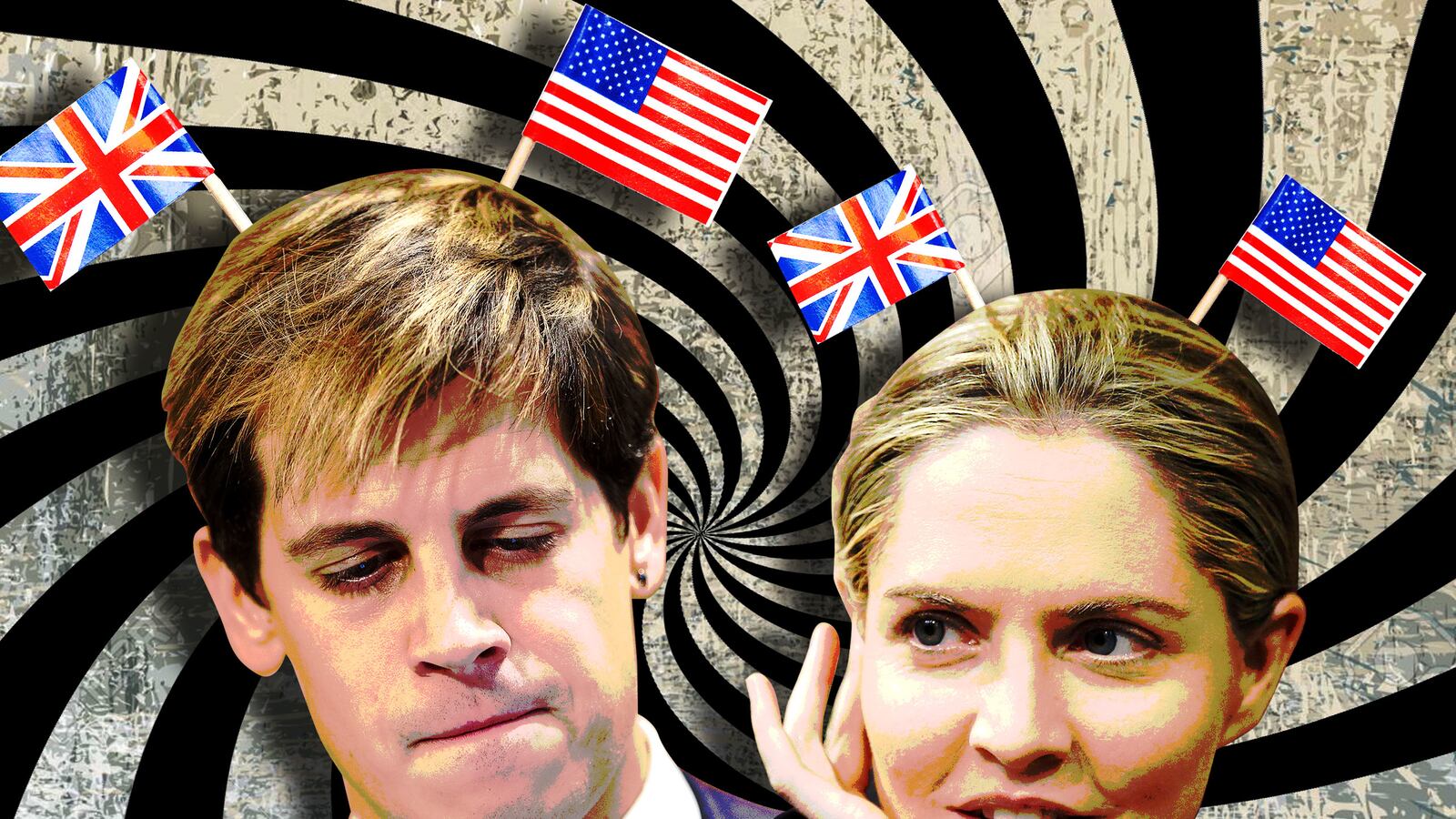Dear Britain: Please stop sending us your failed media celebrities.
Louise Mensch is a former chick-lit novelist, politician, and founding editor of the conservative website Heat Street. In recent months, she has also emerged as unofficial leader of the citizen-detective internet army investigating “Russia-gate,” the ever-evolving web of shady connections linking President Donald Trump and the Kremlin. To follow her hyperactive Twitter feed is to believe Mensch is perpetually on the cusp of exposing a massive conspiracy on the part of Russia, dating back decades, to make Donald Trump president of the United States.
So intricate and far-reaching is this scheme, according to Mensch, that Russian President Vladimir Putin ordered the assassination of right-wing internet provocateur Andrew Breitbart in 2012 – three years before Trump even announced his presidential campaign. This well-plotted murder allowed a then-little known documentary filmmaker (and Russian agent?) named Steve Bannon to take over the dead man’s eponymous right-wing media empire and pave the way for Trump’s Manchurian candidacy. Last month, The New York Times granted Mensch precious space on its op-ed page where she provided a list of supposed Russian collaborators for the House Intelligence Committee to subpoena. The Times published this piece well after Mensch had established herself as an unhinged conspiracy theorist. Since publishing her piece in America’s paper of record alleging a conspiracy so immense, Mensch has gone from fairly paranoid to full-blown McCarthyite. According to Buzzfeed News, Mensch “has accused at least 210 people and organizations of being under Russian government influence.”
Mensch is also British, a trait not incidental to her self-appointed role as vigilant protector of American democracy from its enemies, foreign and especially domestic. Her provenance is significant not least because she was a vociferous supporter of Brexit, which, by Mensch’s own Manichean logic, should make her Moscow’s mole given how blatantly Russian propaganda favored Britain’s leaving the European Union.
A more relevant aspect of Mensch’s nationality, pertains to the way in which her career has followed a trajectory not unlike that of many other media-hungry Brits who wash upon American shores. Having either failed in their native land or found it not big enough to contain their massive egos, these “chancers” (as they are known in British slang) invariably come to America where they find a ready audience among the sort of people who think an English accent automatically confers sophistication.
Englishmen and women on the make have been afflicting Americans since not long after we won our independence, and are Great Britain’s worst export after One Direction. “The Brits believe that they have a birth-given sincerity and that it’s not what you say but how you say it that matters,” the late A.A. Gill wrote in “Brits Behaving Badly,” a 2007 piece for Vanity Fair. “And that all silly, gullible Yanks, from policemen to society hostesses, will wave us ahead on life's road when we open our euphonious mouth.” Gill even came up with an acronym, “D.A.S.” (“Designated American Sucker”) to describe the former colonials who inevitably fall for this shtick.
After Mensch, the other high profile, recent purveyor of what might be termed “Brit grift” is Milo Yiannopolous, the luridly gay right-wing internet troll who finally got his comeuppance this year after an interview surfaced in which he seemed to condone pedophilia. Back in Blighty, Yiannopoulous was a vocally anti-gay marriage Catholic and failed internet journalism entrepreneur. He was also a bit of a killjoy when it came to the matter of online discourse, an interesting biographical morsel in light of his recent reputation for inciting racial hatred on Twitter. Internet access, he once suggested, ought be revoked from “psychologically fragile” individuals who use the anonymity of the web to write “unspeakable things to other human beings that we would never dream of saying in person.”
When his fellow Brits grew tired of him, Yiannopoulos set sail for the United States, leaving behind a string of unpaid employees at his abortive tech industry news website. America is all about reinvention, however, and Yiannopoulos, cleverly sniffing an opportunity, reinvented himself here as an obnoxious antagonist of equally obnoxious, left-wing college campus “Social Justice Warriors.” Gone was the virtuous Catholic lamenting the “coarsening of discourse on the internet.” Taking his place was a self-proclaimed “half-Jewish” apologist for the alt-right. Just as he would opportunistically boast about his love for “black dick” each and every time presented with the racist Twitter musings of his newfound fans on the extreme right, Yiannopoulos (né Milo Hanrahan, aka Milo Andreas Wagner) trotted out the factually suspect claim of Jewish ancestry whenever asked about their anti-Semitic trolling. That it took a months-old, publically available discussion about pederasty to sink this charlatan’s career is more an indictment of Yank credulity than it is of Yiannopolous, who at least deserves some credit for successfully dining out on this con-job for so long.
With his sensationalism, factual inexactitude, and desperate hunger for attention, the modern, peripatetic English hustler is in many ways a product of British tabloid newspaper culture. Robin Leach was Great Britain’s youngest “Page One” reporter when he joined the Daily Mail at 18. He brought the paper’s leering sensibility and penchant for overstatement to Lifestyles of the Rich and Famous, that homage to 80’s excess, along with his comically exaggerated British mannerisms, which Americans automatically associate with the upper class.
The Brit grifter par excellence, though, is Piers Morgan, who trod a similar professional path. In 2004, after a long career in the U.K. tabloid press, Morgan was fired as editor of the Daily Mirror when he published faked photographs of British soldiers abusing Iraqi inmates. A frequent target for ridicule in the pages of the satirical Private Eye, where he is known as “Piers Moron,” Morgan made his way to the United States and became a judge on America’s Got Talent.
When Larry King left CNN to produce a show for Russia Today, the cable network announced Morgan as his replacement. Befitting the tabloid sensibilities of its namesake, Piers Morgan Live was, in the words of David Weigel, “a marriage of checkout-line hype with complete pointlessness.” When not mimicking the suspender-clad geriatric he replaced with fawning celebrity interviews, Morgan used the program to hammer away at his hobbyhorse of gun control. Amazingly, American viewers did not cotton to a citizen of the nation from which their ancestors rebelled advocating the confiscation of their weapons, and Morgan’s ratings tanked. He has since returned to the Mother Country, where he exchanged the guise of liberal gun control advocate for defender of Donald Trump and seems to spend most of his time getting into Twitter battles with better-known celebrities like J.K. Rowling.
Brits in America are “not like the other immigrants, who made it here as the cleverest, most adventurous in the village,” Gill observed a decade ago. “What you get are our failures and fantasists. The freshly redundant. The exposed and embittered.” That description certainly fits Sebastian Gorka, the sort of person who insists on being called “Dr.” despite not having a medical degree. The British-born son of Hungarian exiles, Gorka is serving a tumultuous spell as deputy assistant to President Donald Trump advising him on “RADICAL ISLAMIC TERRORISM,” as Gorka is wont to write. Gorka’s trajectory from reservist in the U.K. Territorial Army (equivalent of the U.S. Army Reserve) to counseling the leader of the free world may be the most impressive example yet of Brit grift, not least because of the unsuccessful detour he made in Hungary along the way.
Part of an influx of ethnic Hungarians who came to the country after the collapse of communism, Gorka spent years trying to enter the fields of national security and politics. It was a largely fruitless effort, as Gorka was unable to obtain a security clearance. This was likely due to his reputation as a “self-promoter, who exaggerated claims about his past, including his work for the British intelligence services,” according to a Buzzfeed News investigation into his Hungarian sojourn, which involved some clumsy dalliances with the country’s far-right fringe. “We understood that Gorka and many like him didn’t return to Hungary because of patriotism or skills but rather because they couldn’t be successful in the West, where they were born or raised,” a Hungarian intelligence officer recalled. That assessment was premature. Embodying the maxim “only in America,” Gorka ventured to the United States, joining the glut of post-9/11 counterterrorism “experts,”, landing a job at Breitbart, and then getting a gig in the Trump administration. .
So prevalent is the British mountebank in America that it has long been a literary trope. Perhaps the earliest specimens of the genre were the King and Duke from Mark Twain’s Huckleberry Finn. Claiming to be disinherited British royalty, these two “rapscallions” swindle their way across the Midwest, conning gullible, small-town Americans with their schemes. A century later, F. Scott Fitzgerald described the type in The Great Gatsby. “I was immediately struck by the number of young Englishmen dotted about,” Nick Carraway observes while in attendance at one of Jay Gatsby’s magnificent parties. “All well-dressed, all looking a little hungry, and all talking in low, earnest voices to solid and prosperous Americans. I was sure that they were selling something…They were at least agonizingly aware of the easy money in the vicinity and convinced that it was theirs for a few words in the right key.”
Evelyn Waugh’s comedic novella The Loved One, a devilish satire of English expatriates in Hollywood, featured the character Dennis Barlow, a poet and failed screenwriter who winds up working at a pet cemetery. In his attempts to court a young cosmetician, Barlow frequently peppers his speech with quotations from Tennyson and Poe while pretending that the verse is his own. Films ranging from Arthur (featuring a dissolute English playboy,played by Dudley Moore, romping around New York ) to Dirty Rotten Scoundrels (in which Michael Caine portrays a suave con man who swindles American heiresses on the French Riviera) fill out the genre.
In fiction as in real life, however, the con inevitably gets exposed. The King and the Duke were tarred and feathered by angry townspeople. After video emerged of him approving man-boy love, Milo was kicked off the program at the Conservative Political Action Committee and Simon & Schuster cancelled his book deal. Piers Morgan lost his CNN show and now spends his days fending off detractors on social media. Mensch is increasingly recognized as an erratic, attention-starved crank. Sebastian Gorka may be leaving the White House after just months on the job.
“You can always count on Americans to do the right thing — after they’ve tried everything else,” Winston Churchill famously said of America’s late entry into World War II. The great British Prime Minister’s observation is one that also applies to our tendency for belatedly detecting the cons, hustles and rackets of his more shameless countrymen.






